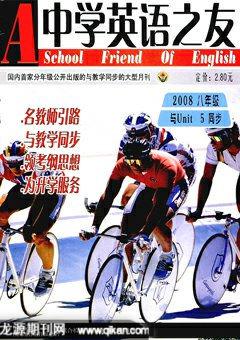新目标八年级下Unit5重难点词汇对对碰
姜经志
一、fast, quick, quickly, soon
1.fast侧重于指人或物运动速度快,它既可以作形容词,也可以作副词。例如:
Are you going there by the fast train? 你打算乘快车去那里吗?
You are always saying I am growing so fast.
你总是说:我长得很快。(句中的fast指的是长的速度快,每年要长高不少。)
Computers are getting smaller, and computing faster and faster.
计算机变得越来越小了,而计算的速度却越来越快了。
2.quick表示动作短促、迅速,也可以指人的思维敏捷,反应灵敏,常用作形容词。例如:
Be quick, or well be late. 快点,不然我们就要迟到了。
After a quick breakfast, he goes to school by bike.
他很快吃完早饭,骑自行车去上学。
3.quickly侧重指某事完成或发生的快,总共延续的时间很短,常指人的思维快,反应快或动作敏捷等。例如:
The next morning, the teacher asked the boy, “How did you find the answer so quickly?” 第二天,老师问这个男孩:“你怎么能够这样快找到答案呢?”(句中的quickly指的是小男孩只花了很少的时间就找到了答案。)
The young man ran away quickly. 这个年轻人很快地逃掉了。(指逃跑这一动作的迅速,而不是指ran的速度。)
4.soon侧重于指两件事的先后发生,中间的间隔时间很短。例如:
So I tried my best to find the answer quickly. Soon I found it.
因此,我想尽快把答案找出来,很快的,我找到了答案。(句中的soon指的是想找答案,和找到答案之间的间隔时间很短。)
Soon they were in the middle of the river. 很快他们就到了河中央。
另外,before long表示“不久、很快”之意时,和soon意思相当。例如:
I think itll fit me quite well before long(=soon), Mum.
妈妈,我想这衣服很快就会适合我穿的。
[小试牛刀]请选用以上词语的适当形式填空。
1. He gives a ____ answer to the question.
2. This is a ____ train.
3. His father is a ____ worker.
4. The young man came back ____.
5. She dressed and went out ____.
Key: 1.quick 2.fast 3.fast/quick 4.soon 5.quickly
二、always, all the time
always是频度副词,意为“总是;一直;经常”,表示动作的重复,状态继续,中间没有间断,通常用来修饰动词的一般现在时态。例如:
Mr Brown is always at home on Sundays. 星期天布朗先生总是在家。
The sun always rises in the east. 太阳总是从东方升起。
always如果修饰动词的进行时,则有“老是;再三地”的意思,带有厌烦、不满、赞美等感情色彩。例如:
Kate is always helping the others. 凯特总是乐意帮助别人。(表赞扬)
The boy is always asking whys.
这孩子老是问这问那,没完没了。(表厌烦)
They are always talking in class. 他们总是在课上讲话。(表不满)
all the time意为“一直;始终;老是”,表示某一个特定阶段的开始一直到结束,不表示频度,多置于句末。例如:
They are running and jumping all the time. 他们一直跑呀跳呀。
The students listened to the teacher carefully all the time in class.
学生们一直在认真听老师讲课。
[小试牛刀]请选用以上词语的适当形式填空。
1. My father ____ goes to work early. Hes never late.
2. I find him working at his desk _____.
3. He was talking and walking and smoking ____.
4. The sun ____ rises in the east.
5. I ____ get up early at six oclock in the morning.
Key: 1.always 2.all the time 3.all the time 4.always 5.always
三、bring, take, get, carry
bring, take, get, carry都表示“带”。
bring意为“带来、拿来”,表示从别的地方将某人或某物带到或拿到说话者所在的地点来。例如:
Please ask Uncle Tom to bring you here in August.
请让汤姆大叔八月份带你过来。
take是bring的反义词,表示“带去、拿去”,指从说话者所在地把某人或某物带去或拿走。例如:
Remember to take your books when you leave.
当你离开时别忘记带走你的书。
get所表达的意义较广泛,就“拿”的意义来讲,与fetch同义,表示请某人带来或接某物来。常用于口语中。如:
Can you get some more water? 你能再取点水来吗?
carry主要表示用力搬运,或指随身携带,不含有“带去”或“带来”的意义,没有方向性。例如:
Why do you carry an umbrella on such a fine day?
天气这么好你带着雨伞干嘛?
[小试牛刀]请选用以上词语的适当形式填空。
1. ____ your umbrella with you when you leave.
2. Next time you come, ____ your son here.
3. Each of the soldiers ____ a big bag on his back this morning.
4. I must ____ my book back from him.
Key: 1.Take 2.bring 3.carries 4.get
四、too many, too much, much too
too many和too much都有“很多的,大量的”意思。 too many常用作形容词,修饰可数名词复数; too much常用作副词或代词,也可以用作形容词修饰不可数名词。much too修饰形容词和副词,意思是“太……”。例如:
There are too many people in the street. 街上有很多人。
He has too many things in his bag. 他包里有太多的东西。
Is watching TV too much good or bad for your health?
电视看得太多对你的健康有益还是有害?
We have too much homework to do. 我们有太多的作业要做。
The wallet is much too expensive. 这个钱包太贵了。
He drove much too fast. 他开车开得太快了。
[小试牛刀]请选用以上词语的适当形式填空。
1. They drank ____ beer yesterday.
2. It is ____ cold today.
3. The doctor told Mrs Brown not to eat ____.
4. This coat is ____ large for her.
5. Look!Therere ____ boats on the lake.
Key: 1.too much 2.much too 3.too much 4.much too 5.too many
五、think of, think about, think over
think of和think about这两个短语表示“考虑”、“对……有某种看法”时,可以互换。例如:
Dont think of/about me any more. 不要再考虑我。
They are thinking about/of buying a new car before the price goes up. 他们正在考虑在涨价前买一辆新车。
What do you think of/about the film? 你认为那部影片怎么样?
think of表示下列意义时,一般不和think about换用:
1. 想要,打算。例如:
Helen, are you thinking of marrying Tom?
海伦,你打算和汤姆结婚吗?
2. 想出;想到。例如:
Who thought of the idea? 谁想出的这个主意?
3. 关心;想着。例如:
Lei Feng was always thinking of others. 雷锋总是为别人着想。
4. 想起;记得。例如:
I cant think of his name. 我想不起他的名字。
think about表示“回想过去的事情”、“考虑某计划是否切合实际”时,一般不和think of换用。例如:
I often thought about what you said last time I saw you.
我常常想到上次见到你时你说的话。
think over意为“仔细考虑”。例如:
Think it over, and youll find a way.
仔细考虑一下,你就会有办法的。
[小试牛刀]请选用about, over或of填空。
1. He couldnt think ____ my name at that moment.
2. Id like more time to think things ____.
3. You can think ____ it and let me know your decision later.
Key: 1.of 2.over 3.about
六、make, do
这两个动词都可译为“做”,但它们在用法上有所不同:
do一般表示进行某项活动,常指做一件不具体的或抽象的事,也表示做某种工作。“做”工作、作业、练习题、早操等,习惯上都要用do。例如:
What do you usually do on Sundays? 你星期天通常做什么?
Hes doing his homework. 他正在做作业。
Its good for you to do morning exercises. 做早操对你有好处。
常见的含有do的搭配词语有:
do housework做家务do sport 做运动do some shopping买东西
make一般指含有创造性的劳动,意思侧重于“制作”、“制造”,也就是将一些原来没有的东西制造出来。“做”蛋糕、风筝、衣服、纸花等习惯上用make。例如:
He is making a kite. 他正在制作一个风筝。
My mother can make a cake. 我母亲会做蛋糕。
常见的含有make的搭配词语有:
make a living 谋生 make fire 生火
make friends 交朋友 make noise 吵闹
[小试牛刀]请选用以上词语的适当形式填空。
1. The little boy likes ____ things.
2. The students are ____ morning exercises now.
3. The girl usually ____ housework for her mother on Sundays.
4. The child is ____ a model plane.
Key: 1.making 2.doing 3.does 4.making

